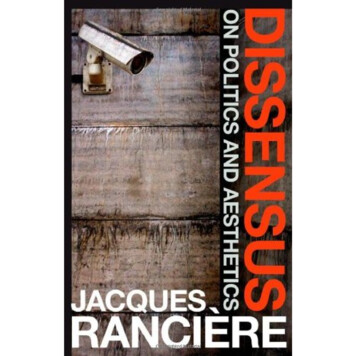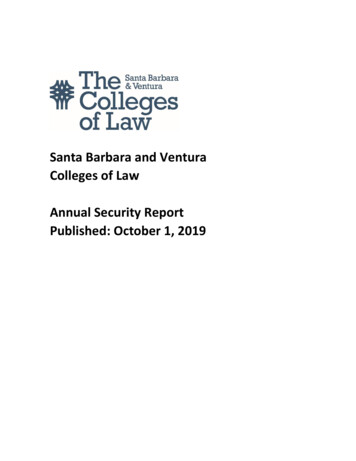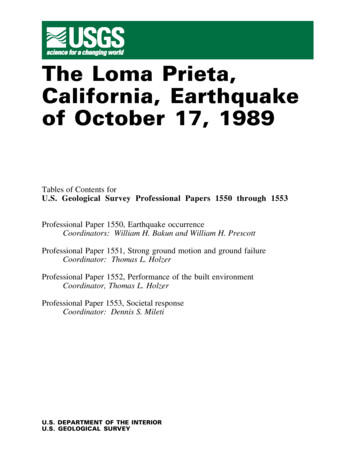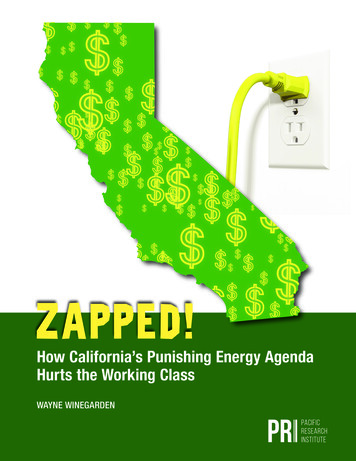
Transcription
DISSENSUSOn Politics and AestheticsJacques RanciereEdited and Translated by Steven Corcoran·"continuum
Continuum International Publishing GroupThe Tower Building80 Maiden Lane11 York RoadSuite 704London SE1 7NXNew York NY 10038www continuumbooks com Jacques Ranciere and Steven Corcoran, 2010All rights reserved. No part of this publication may be reproduced ortransmitted in any form or by any means, electronic or mechanical, includingphotocopying, recording, or any information storage or retrieval system,without prior permission in writing trom the publishersBritish Library Cataloguing-in-Publication DataA catalogue record for this book is available from the British Library.ISBN: 978-1-8470-6445-5Library of Congress Cataloging-in-Publication DataRanciere, JacquesDissensuson politics and aesthetics I Jacques Ranciere , edited and translatedby Steven Corcoranp emIncludes indexISBN-13: 978-1-84706-445-5ISBN-10 1-84706-445-01 Political science--Philosophy 2. Aesthetics--Political aspectsI. Corcoran, Steve II TitleJA71 R36 2010320.01--dc222009023696Typeset by Newgen Imaging Systems Pvt Ltd, Chennai, IndiaPrinted and bound in Great Britain by the MPG Books Group, Bodmin andKing's Lynn
ContentsAcknowledgementsviiEditor's IntroductionPart IThe Aesthetics of PoliticsTen Theses on Politics272Does Democracy Mean Something?453Who Is the Subject of the Rights of Man?624Communism: From Actuality to Inactuality765The People or the Multitudes?846Biopolitics or Politics?917September II and Afterwards: A Rupture in theSymbolic Order?897Of War as the Supreme Form of AdvancedPlutocratic ConsensusPart II105The Politics ofAestheticsThe Aesthetic Revolution and Its Outcomes11510The Paradoxes of Political Art13411The Politics of Literature1529v
CONTENTS12The Monument and Its Confidences; or Deleuze and Art'sCapacity of 'Resistance'16913The Ethical Tum of Aesthetics and Politics184Part III14viResponse to CriticsThe Use of Distinctions205Notes219Index227
AcknowledgementsA number of the articles included in this collection have already appearedin English. I consulted the translation of 'Ten Theses on Politics' byDavide Panagia and Rachel Bowlby, which first appeared in the onlinejournalTheory and Event 5:3 (2001)and remain indebted to their work;'Does Democracy Mean Something?' first appeared in the collectionAdieu Derrida(ed. Costas Douzinas, London: Palgrave Macmillan,2007)and has been extensively reworked here, as has the essay 'Who is theSubject of the Rights of Man?', first published in103 (2004),pp.297-3 10. Thanks areSouth Atlantic Quarterlyalso due to Kheya Bag for permis sion to reprint a slightly modified version of 'The Aesthetic Revolutionand its Outcomes: Emplotments of Autonomy and Heteronomy', initiallypublished inNew Left Review (vol. 14, 2002) . 'The Politics of Literature'SubStance (2004), pp. 10-24. Lastly, I consultedwas first published inJean-Philippe Deranty's translation of 'The Ethical 1\un in Aestheticsand Politics', published inCritical Horizons 7 (2006),pp.1-20.However,the version of it that appears here is taken from my translation ofRanciere's Aesthetics and Its Discontents (London: Polity,2009)pp. I 09-32,reprinted with the kind permission of Sarah Dodgson at Polity Press andJoanna Delorme at Galilee.I would like to thank all those who helped with this project: AurelieMaurin for her vivid discussions of French linguistic subtleties; Gene Rayand Elad Lapidot for their helpful comments on the English translationand incisive theoretical remarks; and Sarah Campbell and Tom Crick atPolity, who showed immense patience and encouragement; and lastly mythanks go to Jacques Ranciere for his graciousness and support throughoutevery stage of the process.
Editor's IntroductionWhat is politics? What is art? And how are we to conceive of theirintimate and attested interrelation? There are at least two ways ofapproaching these questions. First, art and politics,qua singular domainsof human thought and activity, can be taken as two separate realities,each with its own principle of realization. Politics is so construed, forexample, whenever it is defined as a specific form of the exercise ofpower and its mode of legitimation; so, too, is art, when defined, inmodernist or postmodernist terms, on the basis of the ways in whichaesthetic specificity has been gradually won by a liberation from theimperatives of mimetic logic.1 From this perspective, the question thenarises as to whether these two separate realities can be placed in relationto one another and, if so, under what conditions it ought to happen.Conversely, however, art and politics can be understood, such that theirspecificity is seen to reside in their contingent suspension of the rulesgoverning normal experience. On this view, their emergence is in noway a necessary outcome of a property that is supposedly inherent to thelife of individuals or communities. It depends on an innovative leap fromthe logic that ordinarily governs human situations. In characterizingpolitics and aesthetics as forms ofdissensus,Ranciere seeks to defend aversion of this latter alternative. His most general thesis is that whatthese activities do, each in their own way, is to effect a redistribution ofthe sensible, that is of the ways in which human communities are 'spon taneously' counted as wholes divisible into their constitutive parts andfunctions. For Ranciere, genuine political or artistic activities alwaysinvolve forms of innovation that tear bodies from their assigned placesand free speech and expression from all reduction to functionality. They1
DISSENSUSare forms of creation that are irreducible to the spatio-temporal horizonsof a given factual community. In other words, the disruption that theyeffect is not simply a reordering ot the relations of power between exist ing groups; dissensus is not an institutional overturning. It is an activitythat cuts across forms of cultural and identity belonging and hierarchiesbetween discourses and genres, working to introduce new subjects andheterogeneous objects into the field of perception. And as both activities,according to Ranciere, have to do with reorienting general perceptualspace and disrupting forms ot belonging, their interrelation is not a ques tion that needs asking. It can be shown that politics has an inherentlyaesthetic dimension and aesthetics an inherently political one.Ranciere, of course, is not the first to argue that the singularity of theseactivities lies in their radical challenge to the normal social distribution.What is unique about his theorization, however, ishow heconceives ofthis logic of disruption as a process of equality and consequently also theway he is able to analyze the complicated intertwinings of these two formsof exceptionality. If forms of dissensus are irreducible to the objectivity ofthe situation, it is by vinue of what Ranciere refers to as their forms ofegalitarian suspension of the 'nonpal' count of the social order. As stated,the nodal point around which both activities revolve, and which ensurestheir interrelation, is that both are forms of 'dissensus'. First, then, it paysto examine the logic of consensus that every dissensus works to disrupt.Consensus, as Ranciere understands it, is defined by 'the idea of theproper' and the distribution of places of the proper and improper itimplies. This logic is, in his view, the spontaneous logic underlying everyhierarchy: 'it is the very idea of the difference between the proper andthe improper that serves to separate out the political from the social, artfrom culture, culture from commerce' and that defines hierarchicaldistributions where everyone's speech is determined in terms of theirproper place and their activity in terms of its proper function, withoutremainder. It consists in the matching of aanaisthesis,poeisis orway of doing, withor horizon of affects. The essence of consensus, then, is thesupposition of an identity between sense and sense, between a fact andits interpretation, between speech and its account, between a factualstatus and an assignation of rights, etc.By contrast, the logic of dissensus consists in the demonstration ofa certainbetweenimpropriety which disrupts the identity and reveals thepoeisis and aisthesis The logic underlying these practicesgapis amaterialist and anti-essentialist one. Politics is a process, claims Ranciere,2
EDITOR'S INTRODUtnONthat simultaneously denies every foundation on which it might come toform the positivity of a sphere or a purity. As we shall see throughout theessays in this book, the basic logic of this form of innovation against thedictates of hierarchy and the policing of domains is a paradoxical one,A always consists in blurring the boundar non-A. Politics, then, instead of consisting in an activitywhich can be simply stated as:ies between A andwhose principle separates its domain out from the social, is an activitythat consists only in blurring the boundaries between what is consideredpolitical and what is considered proper to the domain of social or privatelife. (As we shall see, the same logic is used to make sense of the singular ity of art.) But we are a far cry here from the motto according to whicheverything is political, including aesthetic self-fashioning. Precisely, ifeverything is political, then nothing is. Similarly the concept of 'thepolitics of art' is not another version of 'engaged' or 'critical' art any morethan it is of 'art for art's sake'. As Ranciere never tires of reiterating, artand politics only ever consist in the effects of equality that they stage, inthe plots which these specific practices of blurring entail. And the uniquenature of these effects, which are irreducible to the normal cause andeffect relations that govern ordinary experience, means that politics andart cannot harbour within them the integrally realizable principle of newsocial order (by the same token, however, nor do they exist totally apartfrom it in their own resplendent brilliance, which, as he points out, alwaysamounts to basing these activities on the very distinctions that they effec tively call into question). There is thus a fine line between Ranciere'sconception of art and politics and any straightforward identification ofthis practice of blurring with ideas of 'art becoming life' or 'everything ispolitical'. Since to reduce them thus, to want to make politics and art dis appear as singular processes, is to miss the singular effects that they bringabout and to return them to the logic of consensus. Art can never becomelife except by being turned into the instrument of those who want tomould a new social ethos; and implementing 'emancipation' will alwaysoverturn into a form of societal management by 'enlightened' experts.The ground can then only ever be ripe for forms of disappointment thatinterpret the dream of emancipation as the root cause of the injusticesperpetrated by those same experts. Ranciere's work has, I believe, enabledus to see more dearly than ever that nothing is more favourable to the estab lished powers than the 'loss' of the thought and practice of emancipation.What is further unique about Ranciere's philosophical enterprise is theway that he attempts to introduce the egalitarian effects of political and3
DISSENSUSartistic action into the core of theory itseH. Indeed, philosophy for Rancieremight similarly be construed as a contingent and no less creative practicethat works, at a higher level of condensation, to level out discursive hier archies by effecting anegalitariandisruption of the prevailing categoriesgoverning perception and action. As a result, for all his insistence onblurring boundaries, Ranciere's own practice of theorizing ought to bedistinguished from the sorts of interdisciplinarity and theoretical devalu ation of universality often associated with so-called postmodern theory.The singular instances of equality in politics and art provide Rancierewith normative points from which to critique present-day understand ings of politics and art. As the present collection reflects, Ranciere'stheoretical apparatus itself is nothing if not geared to intervening in thepresent. Written between1996and2004,the texts included comprisesome of his most stimulating and provocative essays, touching on diversepolitical, aesthetic and philosophical questions of our times - from the statusof theory and questions of progress and modernity to the demise of egali tarian politics and the shrinking political space, from the overturning ofthe emancipatory promise of aesthetic experience into artistic practices ofrestoring the social bond and testifying to an immemorial alienation, notto mention the consensus on the necessity of the world capitalist econ omy and the state focus on security. In so doing, he engages with a diversearray of thinkers from Hannah Arendt to Giorgio Agamben, includingJacques Derrida, Antonio Negri, Jean-Francois Lyotard and Alain Badiou,among others. These essays contain ideas and concepts that have oftenalready been treated in detail in book-length works.2 At the same time,however, they reveal new aspects of these ideas and concepts, as Ranciere'stakes his fight to different fronts or moves to new landscapes that throwup new paths or obstacles, and oblige a reframing of the plots that heproposes for mapping our political and artistic present.THE AESTHETICS OF POLmCSThe present-day circumscription of political activity, we know, is every where permeated and suffocated by the notion of consensus. By restor ing the radical dimension ot political appearing and its effects of equality,Ranciere's concept of the aesthetics of politics provides one of the bestcontemporary antidotes to this most fashionable of ideological notions.4
EDITOR'S INTRODUCTIONIn this vein, then, I'll say a few introductory words about Ranciere's con ception of politics and his critique of the 'police' notion of consensus.Let us begin with the expression 'consensus democracy'. It is a notion,as Ranciere implacably demonstrates, that means far more than the advo cacy of discussion and preference for social and political peace to whichone seeks to reduce it. What it essentially states is that the experience ofthe social order is a common and non-litigious one. A consensual vision ofpolitics always involves an attempt to define the preconditions that deter mine political choice as objective and univocal. Such an experience cantake many forms: it can be 'grounded' in the ancient order of the divisionsof society, or it can take on its current shape as the idea that political actionis circumscribed by a series of flows of wealth, populations, opinions andgeo-strategic forces. Needless to say, the logic of consensus is a major fea ture of the contemporary managerial state. In its current form, the consen sual vision of politics involves two basic operations: a first operation thatreduces the people as political subject to the population, that is to a socio logical category decomposable into its constituent empirical categories;and second, the transformation of politics into the affair of professionalpoliticians and their experts in government whose arrogated function is toarbitrate the residual and marginal possibilities that the objectivity of thesituation permits. Today's worker, precisely, is not a political subject strug gling for equality; he/she is a worker who has rights only insofar as theserights accord with the factual status of the function performed, rightswhich must be continually eaten away at to 'ensure' job protection, thatis, so long as the objectivity of the situation permits it- those who then falloutside of the preserve of worker identity (the unemployed, 'illegal' immi grants, etc.) are no longer excluded; they are simply drop outs.Construed as an equalitarian challenge to the normal social distribution,however, politics is precisely an activity that overturns every suchreduction of the people to the population and of politics to an affair otgovernment. While, as stated, every hierarchical order ultimately restson a logic of the 'proper' that works to separate out different domains,and to allocate different shares to groups based on the supposed propri ety of their place and function of their activity, dissensus is based ona logic of equality that reveals the arbitrariness of that distribution forpolitical participation and artistic practice.Examples of politics in Ranciere's sense stretch from the invention ofthe demos in Ancient Greece to the East German crowds crying'We are the5
DISSENSUSpeople' against their statist incorporation. The feature that binds all thediverse historical instances of politics, is that it concerns a particular kindof speech situation. It consists in the often short-lived moment whenthose who are excluded from the political order or included in it in asubordinate way, stand up and speak for themselves. This speech situa tion is always a litigious one insofar as it is maintained that, contrary tothe justifications for maintaining hierarchical order, no reasons exist thatcan justify excluding anyone from the order of speech. It is litigious inso far as it disputes as baseless the extension of the predicates that definesthe politicity of some and relegates others to the obscurity of the merelygiven. It is litigious insofar as it refutes the forms of identification andbelonging that work to maintain the status quo and, through a violentlypoetic displacement of the prevailing relations of speech, introduces asupplementary speech that is irreducible to the constraints of social place.This is precisely what nineteenth-century workers and women did througha process of extra-institutional litigation. They enacted the rights thatthey were guaranteed by the constitution but were denied by the con straints of the order. As Ranciere puts it, through the fact of their speechthey showed that they had the rights that they had not, and did not havethe rights that they had. Though such claims will not always be seen orheard, politics is effective whenever it does manage to bring abouta global change in the perception of social space through this play oflitigation. Politics for Ranciere is always aesthetic is this basic sense. Ifhe insists on the aesthetic dimension of politics, then, this insistence isto be rigorously distinguished from notions involving the application ofcriteria of beauty to forms of authoritarian power that Walter Benjaminaimed at under the concept of the aestheticization of politics.The logic that this politics of egalitarian litigation entails is a paradoxi cal logic of the 'singular universal'. Against the particular power-interestsof the ruling elite and forms of privatization of speech, political speech,as Zizek puts it, 'involves a local instance that acts as a stand-in for theuniversal: it consists in a conflict between the structured social bodywhere each part has its place and the part with no part" which unsettlesthis order on account of the empty principle of universality- the principledequality of allqua speaking beings'. On this basis Ranciere is also able toshow that the specific kind of conflict entailed in political dissensus hasnothing to do with the forms of struggle associated with the supposeddivide between friend and enemy. Rancierian political dissensus is not a6
EDITOR'S INTRODUCTIONrevival of the dubious Schmittian notion that politics has to do withmaking a decision on the enemy. Politics, for Ranciere, effects abreakwith the sensory selfevidence of the 'natural' order that destines specificgroups and individuals to rule, to public or private life, and that delin eates between friend and enemy, by pinning bodies down to a certaintime and space, that is by pinning individuals to specific bodies. It inventsways of being, seeing and saying, engenders new subjects, new forms ofcollective enunciation. And as the principle of this innovative break isthe paradoxical presupposition of equality, it is simultaneously an activ all can partake, irrespective of the characteristics definingin the situation in question.ity in whichone's beingAgainst the consensual positing of a common and non-litigious experi ence, the supplement of politics demonstrates, precisely, that the social, in thissense, isnot. It introduees a supplement into the social order that severs theobjectivity of the situation from its account, that forces the withdrawalof every idea that those who rule have a disposition or title to do so. Inother words, the egalitarian effects of politics, showing that the uncountedalso partake of political speech, rebounds on the order of earned titles andsupposed dispositions that aim at stitching up social space. It shows that thefact of ruling is not underpinned by an order of reasons. What underpins therule of some is only that factthat they rule, beneath which there is nothingbut the title of the equality of speech - and thus of the capacity for politics which is in itseH belongs to all and no one in particular. The dissensus bywhich the invisible equality subtending social distinction is made visible,and the inaudible speech of those rejected into the obscure night of silenceaudible, thereby enacts a different sharing of the sensible.Further, as Ranciere sees it, the political staging of equality also alwayssevers the fact of the social order from the theoretical accounts given ofthat order. In showing that there is no order of reasons underpinning thesocial order of domination, it disrupts the gesture of complicity betweentheory and the oligarchic social order - the elitist gesture whereby theprivilege of thought is reserved to the few and the vast majority arebanished to shadowy silence or inchoate noise. This rupture is one whoseconsequences Ranciere has always strived to incorporate into theoreticalpractice (we will come to this point again below). As such, his practice ofthinking has pitted him against two mains fronts: the first, of which thefamous Marxist theorist Louis Althusser is a prime example, sets it againstall scientific attempts to know the truth of the masses.3 In Althusserian7
DISSENSUSterms, this was articulated in the well-known distinction between scien tific endeavour and ideological mystification. In contrast to the languageof the masses, ideologically mystified by virtue of their (inferior) place inthe social order, the sctence of the intellectual is that which enables him/her to discern the true condition of the masses. This frame of analysis,forged by one of Marxism's most radical theoreticians, was itself to beoverturned in the unprecedented union of intellectual contestation andworker's struggles that comprised May1968. The shop- floor demandsfor workers' control, for example, escaped the existing forms for repre sentation, which were geared towards negotiation at the top, betweenparty and union structures. Not only were such claims structurallyexcluded from existing structures of 'communication', but they showedthat, contrary to the Althusserian scientific Marxist, the masses do notneed to be told about the reasons for their domination - there are noreasons apart from domination, and what is rather at stake is the beliefin being able to change that order. For many of those who, like Ranciere,were active in May1968, what appeared with striking clarity is thatpolitical reason is not something that occurs behind the backs of themasses; instead, the movements of politics need to be conceived on thebasis of the effects of their own words and actions. Political thought isnot that which is performed in transcendent fashion by the intellectualwho reads culture for its signs of truth, but as that which is producedimmanently by the collective of those engaged in political action.If May1968 disrupted the rigid stratification of the order of speech andput paid to theoretical elitism, then this is because it showed that theworking class which this theory had appropriated for itself, and the sub sequent elaboration of its theoretical task, was more about shoring up aplace for theory itself.The second major front of Ranciere's strategy concerns the more prag matic, liberal attempts to delineate the performative speech conditionsfor politics. The Habermasian schema, for example, supposes that thereexista priori pragmatic constraints that determine that the very logic ofargumentative exchange. It supposes that interlocutors are obliged toengage in a relation of mutual comprehension, failing which they enterinto a performative contradiction and lose their self-coherence. Now thislogic presupposes precisely that the existence of the interlocutors ispre-established. Against Habermas, however, Ranciere emphasizes thefact that genuine political speech above all entails a dispute over the very8
EDITOR'S INTRODUCTIONquality of those who speak. Ranciere's argument in fact undermines allattempts to deduce a form of political rationality from a supposed essenceof language or activity of communication. Political struggle proper istherefore not a matter of rational debate between multiple interests; it isabove all, a struggle to have one's voice heard and oneself recognizedas a legitimate partner in debate. Conversely, the most elementary ges ture of depoliticization is always to disqualify the political quality of thespeech of those who argue demonstrate their equality.Ranciere's unique style of political critique is based in what he see asthe fundamental oscillation between the privatization of speech in struc tures of power and its dis-incorporation through the activities of politicalsubjects. Underpinning this oscillation, in Ranciere's view, is the funda mental presupposition of the equality of intelligences. Equality here isnot an essence, a value, or a goal. It is a presupposition of theory andpractice, but it has no inherent content, nor specific grammar of its own.Indeed, it supports practices of equality only insofar as it is the disavowedpresupposition for the proper functioning of power itself. It is the latentpotential involved in taking the effects of this presupposition as far aspossible which forms the condition of possibility of politics. In otherwords, if it is possible for a political supplement to emerge that disruptsthe social order based on nothing but the presupposition of equality, thisis because the inegalitarian order itself always already presupposes theequality of individuals as speaking beings in its functioning.4 The politicalre-enactment of equality can only emerge because of the inevitablecontradictions of a social order which presupposes equality but simulta neously disavows it.The presupposition of equality,then, is an empty presupposition orvoid in the sense that, while in every order only some are counted asbeing equals among equals, and as capable of social distinction, the oth ers from whom they are supposedly distinct, are always already includedin that equality, precisely because no social or biological trait everexcludes them from enacting it. Moreover, if Ranciere continuallyemphasizes the chance-like nature of politics against all the attempts toexplain political events by referring to underlying causes, it is becausenothing explains why people decide to rise up and demonstrate theirequality with those who rule. Equality, that is, is only ever the preserveof those who decide toinclude themselves out. Which is to say that everypolitical moment involves the incalculable leap of those who decide to9
DISSENSUSdemonstrate their equality and organize their refusal against the injus tices that promote the status quo.The first essay of this collection, 'Ten theses on Politics', simultaneouslycomprises Ranciere's most succinct text on this logic of politics and theaesthetics it implies and a pointed intervention into present-daydoxaabout the nature of politics. His strident formulations distinguish himboth from 'liberal' claims, made after the demise of the Soviet Union,about the 'return of politics', as well as from melancholic claims ot the'end of politics'qua emancipatory project - that is, in both cases, fromclaims that ultimately work to make a radical distinction between thesocial and politics, which, localized in the state, ultimately gets reducedto the struggle for and maintaining of power.The remaining essays of this section, starting with his eulogy to JacquesDerrida, 'Does Democracy Mean Something?', illustrate variou!. aspectsof the 'Ten Theses'. like Ranciere, Derrida set forth an alternate idea ofdemocracy - his much-discusseddemocracy-to-come - to the hegemonicattempts of the new 1990s world order to institutionalize it or usurp itsname. Where Ranciere does so by emphasizing political subjectivation,however, Derrida tries to open up this gap through the category of theOther. He thus ends up tying emancipation not to the activity of a subjectenacting the egalitarian traithere and now, i.e. to political activity, but to anethical attitude of infinite respect for otherness. Ranciere argues that thisexemplarysubstantialization of the other, which shifts the emphasisdemonstration - which inscribes a multiplicity ofdecisively from politicalforms of otherness in supplement to the body of the community - to atranscendental horizon that never arrives, is a hallmark of the contempo rary ethical trend. What is more, caught in the necessity ot having thus toavoid all pre-emptive identifications of a particular event or other withthe Other as such, Derrida ultimately dismisses political speech and itsverification of cases of universality, diverting it for the benefit of a theorythat must continuously deconstruct the occurrence of any actual other.The next essay, 'Who is the Subject of the Rights of Man?' looksmore closely at the operative categories of political subjectivation in themodem age of human rights. The question of who, man or the citizen, isthe subject of human rights, was revived again after the collapse of theSoviet Un
8 Of War as the Supreme Form of Advanced Plutocratic Consensus 105 Part II The Politics of Aesthetics 9 The Aesthetic Revolution and Its Outcomes 115 10 The Paradoxes of Political Art 134 11 The Politics of Literature 152 v . vi CONTENTS 12 The Monument and Its Confidences; or Deleuze and Art's Capacity .










